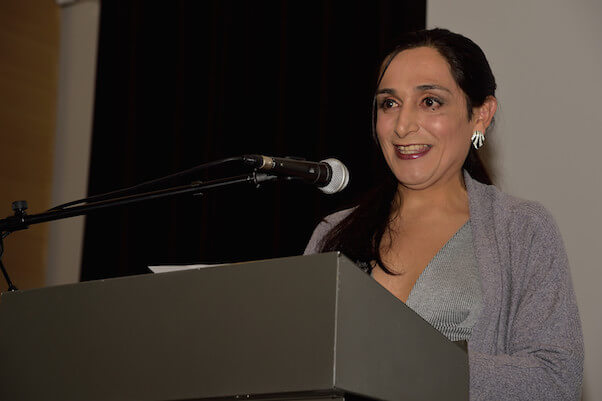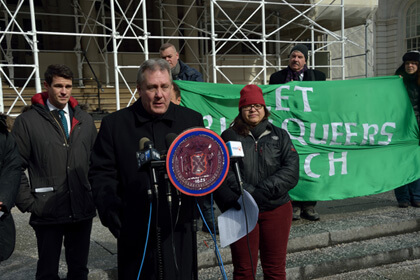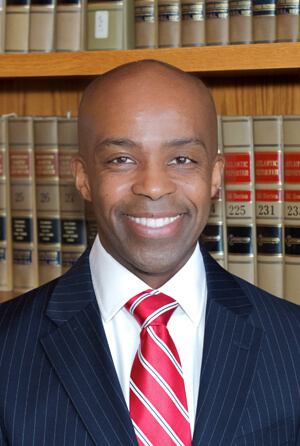Dr. Lee Badgett spoke at a May 31 Ford Foundation forum on a Williams Institute study she co-authored, “New Patterns of Poverty in the Lesbian, Gay, and Bisexual Community.”
David Geffen, Elton John, Ellen DeGeneres, and Tim Gill notwithstanding, lesbian, gay, and bisexual people are poorer on average than their non-LGB counterparts, a report from the Williams Institute at the UCLA School of Law has found.
That gap does not seem to have been closed by recent advances in LGBT rights — though the relationship there is not well understood — yet is has also not led most mainstream LGBT groups to add broad economic justice issues to their agendas.
“As poverty rates for nearly all populations increased during the recession, lesbian, gay, and bisexual Americans remained more likely to be poor than heterosexual people,” the report said.
Report challenges “myth of gay affluence,” calls out need to craft solutions
Strikingly, while about 19 percent of opposite-sex married couples are in poverty and the figure is 20 percent for gay male couples, 33 percent of lesbian couples live in poverty. And while 12 percent of children living with opposite-sex married couples are in poverty, the figure is 25 percent for kids living with male same-sex couples and 19 percent for children living with female same-sex couples.
Race is a factor. African-American children of gay male couples had the highest poverty rate, 52 percent. And African-American same-sex couples had twice the poverty rate of opposite-sex married African Americans.
While a causal relationship was not established by the study, the Williams Institute’s look at data from California, where there are robust civil rights protections based on sexual orientation, found that gay men are doing better than heterosexual men — with poverty rates of eight and 14 percent, respectively. Among heterosexual women, the rate of poverty is 17 percent, while it is only eight percent in lesbians.
Nationwide, however, 14 percent of lesbian and eight percent of gay male couples are on food stamps versus 6.5 percent of opposite-sex married couples.
The Williams study included scant data on transgender Americans to review, but earlier this year, the National Gay and Lesbian Task Force issued a report on that population, “Injustice at Every Turn,” which highlighted disparities even more dire.
Dr. Lee Badgett, a University of Massachusetts economist and public policy professor and one of the authors of the Williams Institute study, “New Patterns of Poverty in the Lesbian, Gay, and Bisexual Community,” presented the report’s findings at a May 31 forum with the Ford Foundation, “The Gay Affluence Myth.” That myth, the report’s authors said, is one many LGBT people themselves buy into.
Asked about the study and the Ford forum, Amber Hollibaugh, executive director of Queers for Economic Justice, said, “A majority of us aren’t wealthy — we’re often poor and working class. There’s a completely distorted image of us out there, so that when you have something occur like a recession it multiplies the crisis if people believe that LGBT are somehow wealthy. And LGBT groups aren’t addressing that, so it remains a myth that moves forward.”
Hollibaugh continued, “The report is important, but I was struck by the way that all the people in the room and Lee herself were concerned that it would fall off the radar screen and not be part of how the LGBT movement is prioritizing its issues.”
Recent data on income and wealth disparities gathered by the US Census’ American Community Survey (ACS), the Center for Disease Control and Prevention’s National Survey of Family Growth (NSFG), and the Gallup polling organization.
The report comes at a time when income inequality in the United States has literally shot off the charts, at least those published by the International Labor Organization. Using something called a Gini coefficient, where a zero is perfect equality and 100 means “one rich household gets all the income for an entire country,” the US rating is now at 47.7, with all other developed countries between 20 and 35. And while the Williams report says that “poverty rates for nearly all populations increased during the recession,” inequality also rose during the same period. The rich got richer.
Michael Adams, executive director of Services and Advocacy for GLBT Elders (SAGE), spoke at the Ford forum about the special problems of LGBT older people, saying that his group’s main concern “is not a rights-based agenda, but economic and health security.” While access to marriage is a key economic concern for many gay and lesbian Americans, “older couples often choose not to marry,” Adams said, because of the way it can jeopardize benefits each member of a couple has individually.
This isn’t the first Williams report showing a poverty gap disadvantaging LGB people. Badgett told Gay City that the recession that began in 2008 “had more of an impact on groups that are already vulnerable. The other issue is that the kind of equality we have at the state level is incomplete and in many states we don’t have equality. State laws may not be as effective as federal laws. And straight couples don’t have DOMA to contend with,” a law that denies federal benefits even to same-sex couples legally married in their states.
What needs to be on the agenda of LGBT groups to close the gap? Most leading advocacy organizations in the community are focused on equal access to jobs, housing, public accommodations, and relationship recognition. Efforts are also made by many groups to increase funding for LGBT social services such as aid to older people and homeless youth.
“We talk about the problem,” Badgett said. “We’re not at the stage of talking about solutions. That’s the next stage, and these things are pretty complicated. We’re going to try to simulate what changes in minimum wage would do and what would happen if we eliminated discrimination.”
Veteran gay activist Bill Dobbs faulted the LGBT movement’s focus on equality to the exclusion of other goals.
“Equality under the law is great, but it is only a small vision compared to social and economic justice,” he said. “When Occupy Wall Street began and a queer caucus began, there were many people in and around it so stepped in equality that they had a hard time understanding economic justice. This is a leadership failure by Gay, Inc., which has had nothing to say about health care reform despite 400,000 gay and bi men dead of AIDS. They stand for formal legal equality in a very narrow way, but do little to get people to understand that there are bigger things to be had — social and economic justice or even liberation.”
Hollibaugh said issues of economic class are at play in the failure of a broader vision.
“If the most visible part of community is relatively well-resourced — not struggling — and they build the advocacy agenda, then homelessness, health insurance, and housing become secondary issues,” she said. “It’s not like the Task Force or Pride Agenda hasn't done something specific [around economic justice], but it has to be consistently imbedded in all the work you do. Until LGBTQ groups start saying that capitalism is the problem, not the solution, economic justice is unlikely to be a priority issue.”
New York’s leading LGBT advocacy lobby, the Empire State Pride Agenda, pointed to both its top goal in Albany and its overall mission statement when asked about the breadth of its efforts.
“Our statewide legislative priority, the Gender Expression Non-Discrimination Act (GENDA), would help address some of these problems by making it illegal to fire someone or throw them out of their home just for being transgender,” said George Simpson, an ESPA spokesman, in an email message. “Likewise, our advocacy for better funding for LGBT health and human services primarily impacts members of our community who are at an economic disadvantage, such as seniors and homeless youth. Marriage, too, offers protections and economic security that are even more critical for people with limited resources. It’s important to show the true face of the community, because this myth of an affluent minority does a disservice to our movement.”
While Simpson was unable to provide specific examples of ESPA getting behind basic economic justice issues such as the minimum wage, healthcare reform, or progressive taxation — despite the support that group and other top LGBT organizations get from unions and others that do prioritize these issues — he pointed to the mission statement spelled out on its website that pledges support of “common struggles for equality and justice” with allies in “other marginalized groups,” including a commitment to “break down barriers based on class and economic status.”
ESPA has been involved in the coalition working for the Women’s Equality Act in Albany, and has led a wide range of groups pressing for greater funding of runaway and homeless youth needs.
The Human Rights Campaign, the leading gay lobby group in Washington, did not return a call and email asking about its involvement in economic justice beyond an LGBT-specific agenda.
Asked her view of the path forward, Hollibaugh said, “The places I am looking are places that have on-the-ground constituencies that are already impacted, like SAGE or in the labor movement, that will help move the queer piece — rather than GLAAD or the Victory Fund.”
SAGE’s Adams emphasized the importance of coalition in addressing the full breadth of issues affecting LGBT communities.
“There is no question that if we want to address disproportionate poverty among LGBT people, including LGBT older adults, it will be incumbent upon LGBT organizations to step out to advocate on issues that have not been seen as LGBT-specific issues,” he wrote in an email message. “For example, for LGBT older adults it’s very important that SAGE and other organizations actively support the defense of Social Security and Medicare, which are under increasing assault. That’s what coalition is all about.”




































